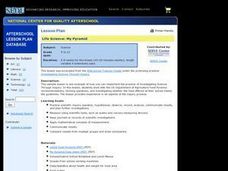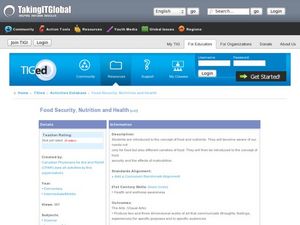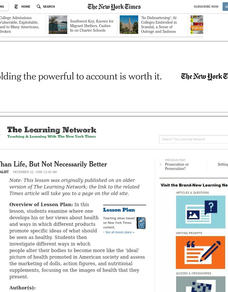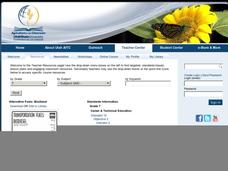Curated OER
A Reef of Your Own
High schoolers research and study the life and reproductive strategies of reef building corals. They examine how coral reefs can produce high levels of biological material when they are surviving in areas of low nutrition.
Curated OER
Nine Months in Six Weeks
Student study possible effects the mother's nutritional habits will have on her baby. They see how important it is to eat right and examine a regular diet for a pregnant woman or one for a woman with diabetes or other physical problems.
Curated OER
Better Weight
Students investigate a Biblical based weight loss program which asks them to read, take on-line quizzes and tests, assess their level of physical activity, explore nutrition and food guidelines and determine whether weight loss would be...
Curated OER
Gathering, Traditions, and Nutrition of Our Food
Students gain a better understanding of what it means to eat seasonally through learning about traditional hunting, gathering, and food preparation methods of Athabascan tribes. By interacting with Native American Elders and...
Curated OER
Health and Nutrition
Students examine vocabulary words that deal with the parts of the body. They identify the body parts and organs associated with the five senses. They identify common illnesses, causes and treatments. They research various lifestyle...
Curated OER
Life Science: My Pyramid
Students examine how the school food program compares to the food pyramid recommendations. In this food pyramid lesson plan, students compile data regarding the food choices available in the school through the lunch program and vending...
Curated OER
ADULT ESOL LESSON PLAN--Level 2--Health and Nutrition
Students, as they extensively review the vocabulary words on the board, examine the parts of a label and why it's so crucial to follow the directions on medicine labels to avoid reactions and the possible causing of future health issues.
Curated OER
Nutrition
First graders identify the Five Food Groups and the proper servings of each. They study the physical features of different foods such as fruits, and vegetables.
Curated OER
Food Security, Nutrition and Health
Young scholars examine the concepts of food security and malnutrition. In this healthy diets instructional activity, students discuss hunger. food security, and malnutrition. Young scholars collages that depict a world in which no one...
Curated OER
Bigger Than Life, But Not Necessarily Better
Students evaluate images of health in American society, then students examine where one develops his or her views about health.
Curated OER
Communicate Effectively on Health and Nutrition Topics
Students review vocabulary of common illness necessary to request medical attention. They work in groups to play pictionary using related vocabulary wordsassociated with their health.
Curated OER
Career & Technical Education: Grade 7
Educate your learners on the importance of using bio-diesel as an alternative transportation fuel. Provided here are several links to books (with reviews), a 24-page informational text in three reading levels, a corn activity, and...
Curated OER
Caribou
Eighth graders study the cultural and nutritional importance of the Caribou in Inupiaq life. In this World History lesson, 8th graders analyze primary sources that explain these people's lives.
Curated OER
ESOL Health and Nutrition
Students brainstorm and discuss vocabulary words which identify various health care providers and facilities. They work in pairs and share their own health care experiences and write sentences about them.
Curated OER
Responsible Eating
Students identify healthy eating habits. For this nutrition lesson, students discuss the food pyramid and healthy food choices. Students track their daily food intake in a journal.
Curated OER
4-H Food Science- Intermediate Activity
In this nutrition worksheet set, students complete a dinner detective nutrient fill in the blank, a food safety true or false page, and plan a picnic with food safety rules in mind. They investigate careers that involve food safety.
Curated OER
Nutrition: How important is rice to the world?
Fourth graders point out places on a map that grow rice around the world. In this rice growing lesson plan, 4th graders read about the importance of rice and use a map to see where it comes from.
Curated OER
Nutrition and Energy Flow
In this energy flow worksheet, students will complete 10 short answer questions based on a food web diagram. Then students will review different cycles in nature including the water cycle, carbon cycle, and energy cycle. This worksheet...
Curated OER
The Secret Life of a French Fry
Students explore where the food they eat comes from. In this food lesson, students look at agriculture and food production. They follow the production of a french fry and discuss all the steps it goes through before being served.
Together Counts
Foundations of Wellness
You may be physically healthy, but what about mentally and emotionally? How is your social health? Kindergartners and first and second graders learn about the importance of maintaining their health in all aspects of their lives with a...
Curated OER
Food & Science - How Healthy is Your Diet?
Learners experiment with various foods to determine fat and starch content. They rub jam, peanut butter, bananas, and other foods in a small circle on a piece of paper, and observe the results. If there is a high fat content in the...
Curated OER
Making a Grocery List
Students explore vocabulary words related to groceries. Students examine words that can be used immediately, in every day life, particularly in the grocery store. They demonstrate the sounds of letters. Students match labels and sentences.
Curated OER
Check Out This Label
Students participate in a discussion on why food labels are important and how they were developed. Using the internet, they research what is meant by the 'use by' date and discover how the ingredients are listed on the package. They use...
Curated OER
What's in a Willow?
Students study of nutritional value of edible native plants. discriminate between foods that have nutritional value and those that do not. They relate how food can affect how they think, feel, and perform.




